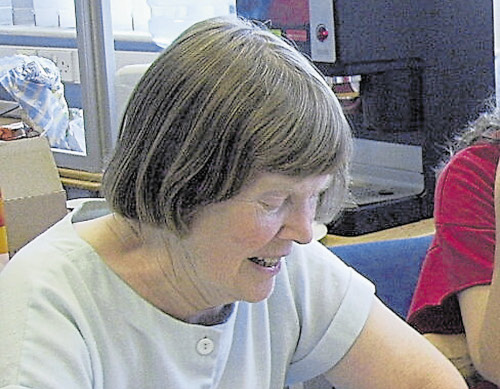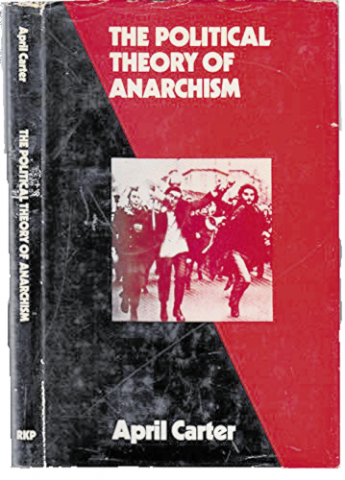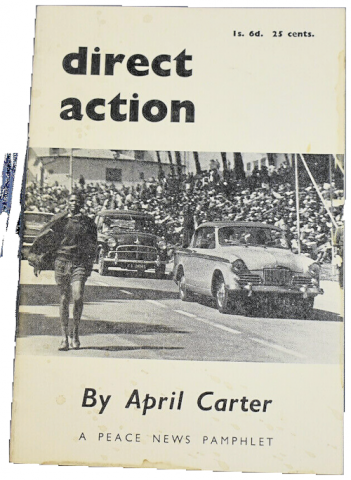
April Carter’s father was an engineer with the British colonial service and April spent the first 10 years of her life in East Africa. Returning to the UK in 1947, April was enrolled at a public school in Gloucestershire, not far from the family home in Cheltenham. The staff at the school recognised April’s outstanding intellectual abilities and fast-streamed her through the English secondary school examination system – resulting in her being offered a place at Oxford university. Deciding that she was too young to take up a scholarship to Oxford, she chose to sit the civil service exams, and took up a position in the foreign office in the mid-1950s.
It was during this period that public concern was growing about the threat to human existence posed by atomic weapons, and the newly developed hydrogen bomb in particular.

In May 1957, Harold Steele, a retired poultry farmer from the west of England, set off [see p17] to join a ‘peace fleet’ that was due to sail from Japan towards Christmas Island in the Pacific where Britain planned to explode its first H-bomb.
A group of peace activists committed to nonviolence came together to support him in this endeavour, which came to be known as the Direct Action Committee Against Nuclear War (DAC). Steele failed in his attempt but the Committee decided to continue its work.
The original group, drawn from pacifists associated with Peace News, was joined in 1958 by a younger generation of activists, including Michael Randle, Pat Arrowsmith and April Carter, who became secretary.
They decided to focus their energies on organising a march from central London to Aldermaston, the location where the UK’s atomic weaponry was being developed.
April played a core role in the organisation of the march, which took place over the Easter period of 1958. According to Michael Randle, April was keen for there to be some kind of dress code, so that people would take the message of the march seriously.
In its mission statement, the DAC affirmed that its role was ‘to assist the conducting of non-violent direct action to obtain the total renunciation of nuclear war and its weapons by Britain and all other countries as a first step in disarmament’.
In late 1958, the DAC began a prolonged campaign against the construction of Thor rocket bases in Britain. The most significant of these protests took place near Swaffham in Norfolk, on 6 and 20 December 1958, when activists tried to enter the construction site. It was April’s participation in the protest at Swaffham that led to her first experience of imprisonment.
What needs to be emphasised here is the significance of this relatively small group of activists in influencing the style and the culture of the first wave of British anti-nuclear protest. The methods and the principles of the nonviolent direct action (NVDA) that they pursued in the 1950s and 1960s had a lasting impact upon British popular movements for change in the second half of the 20th century and beyond.
It was due to the activities of the DAC and the larger Committee of 100, which superseded it, that NVDA and civil disobedience became an integral and accepted dimension of popular protest for subsequent generations of activists in the UK and beyond. At the heart of this seminal initiative was April Carter – a young woman whose quiet demeanour and unassuming manner belied an iron will and a fierce determination to act upon her principles.
In March 1962, Peace News published a pamphlet entitled Direct Action written by April, who had been appointed an assistant editor at the paper. In 1973, April published Direct Action and Liberal Democracy, in which she developed some of the themes addressed in the columns of Peace News in 1962. This book followed her 1971 publication The Political Theory of Anarchism.
“April Carter – a young woman whose quiet demeanour and unassuming manner belied an iron will and a fierce determination to act upon her principles”
The DAC developed strong links internationally, particularly with the Committee for Nonviolent Action (CNVA) in the USA.
Activists from both groups came together to oppose French nuclear testing in the Sahara in early 1960. The aim of the action was for a team of internationals and Africans to set off from Accra in Ghana and travel over 2,000 miles to the proposed test site near Reggane, in what is now central Algeria, in the French Saharan desert.
The French colonial authorities prevented the activists from traversing what is now Burkina Faso but, despite the failure to achieve their primary goal, the team did succeed in attracting a lot of attention in Ghana and served as a focus for opposition to atomic testing in other parts of Africa. Indeed, Bayard Rustin claimed it was the most significant pacifist project he had been associated with.
April’s interest in transnational social movements and cross-border political activism was also evidenced when she played a central role as editorial advisor in the publication of Howard Clark’s edited work, People Power: Unarmed Resistance and Global Solidarity (2009).
As Howard acknowledged: ‘Without April Carter, I don’t know when this book would have seen the light of day. She has been a marvellous source of advice and encouragement, commenting on every contribution, editing several, firing off reminders when they were needed, and in general keeping this project on track.’

Alternative defence
In 1980, April, with support from Adam Roberts, initiated the setting up of the Alternative Defence Commission (ADC), with its base at the Peace Studies Department, Bradford University.
It had been April’s idea, informed by the desire to move on from a position of protest to the constructive development of a defence policy for the UK that did not rely on nuclear weaponry.
During her academic career, April taught Politics at the universities of Lancaster and Oxford in the UK, and at Queensland in Australia. After her return to the UK from Australia she was for a while without an ‘academic address’. Accordingly, it was my honour as director of the Centre for Peace and Reconciliation Studies at Coventry University to offer her the post of honorary research fellow. She did us proud, with the Centre accruing status with every mention in her subsequent publications.
April continued to follow political developments throughout the world and, in 2011, published another significant work on the theme of civil resistance and ‘people power’ – People Power and Political Change: Key Issues and Concepts. Let me close this tribute to April’s life-long work with the final paragraph from the book. The tone is undemonstrative, reasoned, quiet almost – but the strength with which she held the underlying values shows through:
‘The central emphasis of this book is on the political importance of people power as a phenomenon: the remarkable fact that ordinary men and women armed with nothing but courage, determination, ingenuity and ability to cooperate can undermine and overthrow regimes defended by ruthless security services and armed with the latest weaponry. The importance of protest is worth asserting because academic analysts, suspicious of immediate impressions, are often reluctant to accept that people power is really significant. There is a strong tendency – especially in retrospect – to minimize the role of the popular protests and emphasize instead the significance of long-term trends, the underlying economic, military or political weaknesses of the regime, the role of international pressures or the importance of elite negotiations. All these factors may indeed influence both the context of resistance and the final outcome – and this book seeks to take them into account. There is, moreover, always room for competing interpretations. But progress towards democracy requires popular commitment to achieve it.’

